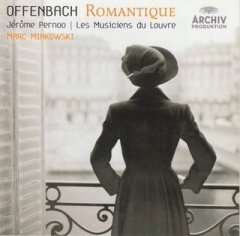Jacques Offenbach – Romantique (Minkowski) [2007]
Jacques Offenbach – Romantique (Minkowski) [2007]

01. Offenbach Orpheus in the Underworld (1874) - Ouverture 02. Offenbach Concerto for Cello and Orchestra : I. Allegro maestoso 03. Offenbach Concerto for Cello and Orchestra : II. Andante 04. Offenbach Concerto for Cello and Orchestra : III. Allegretto 05. Offenbach Les Fees du Rhin : I. Overture 06. Offenbach Les Fees du Rhin : II. Ballet 07. Offenbach Les Fees du Rhin : III. Grande Valse 08. Offenbach Ballet des Flocons de Neige from Le Voyage dans la Lune : I. Introduction 09. Offenbach Ballet des Flocons de Neige from Le Voyage dans la Lune : II. Les hirondelles bleues 10. Offenbach Ballet des Flocons de Neige from Le Voyage dans la Lune : III. Le Bonhomme de neige 11. Offenbach Ballet des Flocons de Neige from Le Voyage dans la Lune : IV. Les flocons anim? 12. Offenbach Ballet des Flocons de Neige from Le Voyage dans la Lune : V. Polka 13. Offenbach Ballet des Flocons de Neige from Le Voyage dans la Lune : VI. Mazurka 14. Offenbach Ballet des Flocons de Neige from Le Voyage dans la Lune : VII. Variations 15. Offenbach Ballet des Flocons de Neige from Le Voyage dans la Lune : VIII. Galop final Jerome Pernoo - cello Les Musiciens du Louvre Marc Minkowski
Most of us know our Offenbach through a secondary source; we have heard it either through Gaîté Parisienne, which is Offenbach as rescored by modern composer Manuel Rosenthal, or through the various versions of his opera Les contes d'Hoffman, a work that Offenbach did not live to finish. The "authentic" Offenbach is recorded in manuscripts that are scattered all over the world, which musicologist Jean-Christophe Keck has been going to great lengths to gather up for publication in his Edition Offenbach-Keck, issued through Boosey & Hawkes. Keck's advocacy of Offenbach has done the composer some good -- it has led to the revival of such "lost" works as the opera Les Fées du Rhin and to a critical edition of Les contes d'Hoffman that seems to settle the matter of its intended shape. Offenbach Romantique, the Archiv release featuring Marc Minkowski and Les Musiciens du Louvre, utilizes Keck's editions as a point of departure and purports to give us a different spin on Offenbach's music that is closer to his own milieu than the many intermediary transmissions that exist of his orchestral work.
The main event here is the Concerto militaire, the 1847 cello concerto that established Offenbach as the most formidable cello virtuoso of his day. This concerto has been recorded a couple of times in a truncated, incomplete version cobbled together from sketches in the 1940s by cellist Jean-Max Clément. Keck has rebuilt the full, three-movement concerto from manuscripts located piecemeal in Germany, France, and the United States, and this is the version heard here, as played by young cellist Jerome Pernoo. Parts of it are unbelievably difficult, and Pernoo handles it with panache. The Concerto militaire operates at such a high level of difficulty that it is doubtful to enter the repertory for the cello, but this version makes a heck of a lot more musical sense than Clément's edition. The remainder of the disc includes the original overture to Orphée aux enfers, a short instrumental suite from Le Fées du Rhin (which includes an early version of the famous Barcarolle from Les contes d'Hoffman), and the captivating Ballet of the Snowflakes from Voyage dans la lune. The performances are lively, well paced, and played on "original instruments" that nonetheless sound about the same as modern instruments.
One aspect of Offenbach Romantique that does not come across is that Keck and Minkowski seem to want to you to deduce from their earnest, hard-earned handiwork concerning Offenbach is that his music, heard in its original form, constitutes "serious" romanticism on a level with his German contemporaries -- Brahms, Schumann, and the like. Offenbach's music isn't like that; even in its original guise, it sounds closest to the Strausses of anything that was out there in the nineteenth century. That said, Offenbach Romantique still makes for highly enjoyable listening and does inspire discussion as to what extent some measure of forward inspiration Offenbach may have had on Tchaikovsky, whose ballets are certainly no longer regarded as light music, even though technically they belong to that idiom. ---Uncle Dave Lewis, Rovi
download: uploaded yandex 4shared mediafire solidfiles mega filecloudio nornar ziddu
Zmieniony (Środa, 05 Marzec 2014 10:35)








